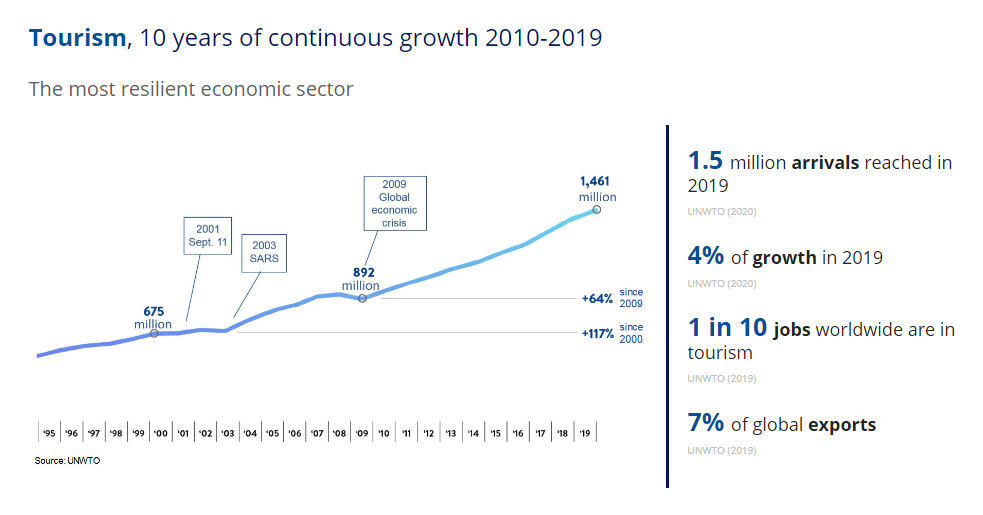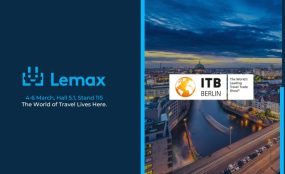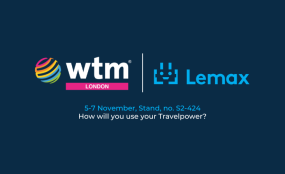
Many are wondering what the future of the tourism and travel industry will look like.
Obviously, the strict measures in the face of the COVID-19 pandemic, which limit the movement of people globally, greatly affected this industry.
This also raises the question about the future of the Lemax business, considering we work in the travel industry.
However, we at Lemax have every reason to be optimistic!
As a CEO of Lemax, I’d like to explain these reasons to you, and hopefully, paint a picture on what it means to have your own IT product – not just any product, but a core SaaS business solution – and sell it on the global market.
Here are 5 reasons why I think the future of Lemax is very bright, as is the future of travel and tourism industry:
- Our product is a CORE business software solution to the KEY problems of our customers.
- Investing in digital transformation is the only way travel companies will survive.
- As a product company, we are one of a few, while custom services companies are one of (too) many.
- The financial structure of the SaaS business model provides both the stability and the prospect of steep growth.
- Travel and tourism are among the most resilient industries in the world.
1. Our product is a CORE business software solution to the KEY problems of our customers.
There are lots of software solutions that solve particular segments of clients’ problems, which makes them non-essential. Our software, however, being the core business solution, solves many of our clients’ problems, and particularly their key business problems. And that makes our product essential.
It’s understandable that no company will invest their money easily in non-essential tech solutions, not even in normal times. But investments in software solutions like ours are capital and strategically important investments. And companies (in any industry) do not churn lightly from strategically important tech solutions that are essential for running their business and which they’ve spent months or even years implementing. But they will cut off non-essential solutions in a heartbeat.
2. Investing in digital transformation is the only way travel companies will survive.
We have spent hours talking to our customers, prospective clients and business partners from all continents, reading what the big players in this industry say in the media, and we’ve been attending online travel & tourism conferences. The one theme that has repeated in all of these conversations is this: technology is crucial for the survival of travel companies – and not just now, but in the long run, too. How so?

This crisis is only a catalyst for the inevitable changes that the travel industry had to undergo sooner or later. For one, there are too many travel agencies and tour operators that are barely efficient because they depend on their manual processes or outdated technology, which is not even sustainable, let alone scalable in the long run.
Moreover, even those that were doing ok before the crisis weren’t incentivized to think about how they could do even better. They were earning solid money, so why bother with process improvements and automatization? They were simply too busy doing their jobs to take a step back and critically examine their inefficiencies.
However, now they have plenty of time to think about that since the demand for travel has unfortunately dropped to basically zero.
And they are thinking about it, which we can tell not just by what we’ve heard from the industry, but also by the increasing number of leads in our sales pipeline.
So how exactly will investing in digital transformation help travel companies survive this?
Many companies are cutting their costs – primarily non-essential costs, which, as rough as it sounds, also includes letting go of their people. Yet, at the same time, they are thinking about how to invest their money wisely. Why is that so?
Investing money in technology that automates their processes now will enable travel companies, once things go back to normal, to bounce back much faster than their competitors. Demand for travel will start increasing again, and who is going to be there to supply it? A lot of companies will cease to exist as they will go bankrupt, so there will be fewer competitors on the market. Among those that will remain will be those who are financially stable and most probably technologically advanced. They will pose a significant threat to all the others.

Of course, companies that don’t have automated and efficient processes in place will also want to provide service to customers; however, they won’t have the means to do so efficiently as they had to reduce the number of their employees. Naturally, they will want to hire them back (if they can afford to do so), which will be very slow and expensive because the greatest cost to any company is workers’ salaries. Therefore, they won’t be able to bounce back any time soon. In contrast, companies that invest in the right technology now won’t have to rehire; instead, they will speed up their business and at a lower cost. In other words, investing in digital transformation now will be travel companies’ competitive advantage tomorrow.
3. As a product company, we are one of a few, while custom services companies are one of (too) many.
Being successful at building and selling a product is much harder than offering custom IT services for a number of reasons, but that’s a topic for a whole other article. However, because of that, very few companies decide to build their own product, and those who do rarely succeed. That is why most IT companies in Croatia and worldwide sell their custom IT services. Still, many would like to build their own product if they could, especially now when their income has dropped due to a fall in demand.
In what ways is having a product better than offering custom services?
- It’s much easier to differentiate yourself as a company if you have a product, especially if it’s a core business product. Many companies offer custom services, which are relatively easy to copy. However, the chances that another company is offering the same or similar product as yours are very low. What’s more, products are much harder to copy, especially big, complex products like ours that take years to develop. Therefore, even in times when demand is in free fall like it is these days, it will fall much less so for products than for custom services.
- If you don’t have something supreme to differentiate yourself, like a product, the only thing that can set you apart from the competition is the price. So custom services companies are often – and now in particular – forced to lower their prices if they want to acquire new customers. This is very problematic in the long run because, with salary levels ever-increasing, they won’t be able to afford their workforce and won’t stay competitive on the talent market.
- On the other hand, product companies don’t have to compete with low prices. When you have something unique that no one else offers, especially when it solves core problems, customers are more likely to focus on its value and not so much on the price. After all, most customers will pay for a product once they realize that the return of their investment will be multifold.
- Furthermore, product companies tend to be more profitable than custom services companies. That is because they generally have higher gross profit margins (percentage of gross profit in their total revenue). This means that, in the long run, the only Croatian IT companies that will be able to compete with foreign companies for the scarce talent pool – and they are the ones that drain our brains – will mostly be successful product companies.
It’s important to say that things are also rough for newly developed products that aren’t yet recognized on the market and don’t have a stable client base. But we are in a much better position than typical startups because our product has been on the market for 20 years and its value is recognized by 120+ customers worldwide. This gives us a strong reputation in the travel industry and is a door-opener for new prospective clients and markets. Some of the biggest clients we have came to us through referrals from existing clients.
4. The financial structure of the SaaS business model provides both the stability and the prospect of steep growth.

Looking at the financial aspect, there is a major difference between selling a product and selling custom services. In the latter case, every new year is practically a clean slate in terms of income. Custom services companies basically depend on new projects, and even though some are long-lasting and huge deals, usually once the job is done, that’s pretty much it. If we put aside the maintenance and support fees they receive, unless they upsell, there isn’t a significant use of that same customer.
Also, everything is good when sales are going well. But the problem is when companies don’t manage to sell. And these days, it’s really hard to sell anything! So custom services companies are having trouble making new deals at this moment. Some are still financially stable as they are delivering projects sold before the crisis. But they can expect a significant drop in their incomes in a few months due to a lack of new projects.
On the other hand, we are a SaaS company, so we don’t depend on every new sale we make. Instead, we have a base of clients who pay their yearly subscription fees. That is unless they churn, which none of them have done so far since the pandemic started. So every new year for us isn’t a clean slate in terms of income because we receive recurring revenue from client subscriptions. This means that our existing clients cover a significant portion of our costs, so acquiring new clients enables us to grow more. Very few companies in Croatia have recurring revenue, which places us among the more financially stable ones. Recurring revenue also allows us to plan our budget much more precisely and much longer into the future. And being able to predict your budget with precision and much in advance has enormous benefits.
5. Travel and tourism are among the most resilient industries in the world.
Take a look at this graph by the World Tourism Organization, showing tourism growth over the last 10-year period.

As you can see, the major world events that negatively impacted the global economy, only briefly affected the travel and tourism sector (T&T). This sector has been steeply growing for the past two decades and outpacing the global GDP growth of 2.5% for the last 9 years.
What makes travel and tourism so resilient?
My take is that travel and tourism have become the new normal. It’s not a luxury anymore like before, but a standard of living in the developed world. Also, traveling is much cheaper than before, so more people can afford it – and more people want it. After 9/11, people started to fear terrorist attacks – and rightly so, as they continued in major cities around the world for years to come without any warning. Yet, despite this fear, travel did not decline: it kept growing.
Furthermore, T&T is a great source of income for entire economies, not just that sector. It enables the influx of foreign money into the country. It supports 1 in 10 jobs worldwide and creates 1 in 4 new jobs. It contributes by 10.3% to global GDP. Entire economies around the world depend on travel and tourism! Without tourists, local producers have no one to sell their goods; bars, hotels, and restaurants have fewer customers to offer their services. Pilots, taxi drivers, waiters, receptionists, travel agents, cleaners…they are all affected! This implies it’s in every government’s best interest to invest money to save strategically important T&T businesses, and they have been doing so ever since the pandemic started.

All in all, global events like pandemics might change the nature of travel, but travel will never cease.
The only thing that will change is the emphasis on safety. When you look at what happened after 9/11, airlines imposed rigorous security measures, and although they might seem like a hassle, they actually make us all safer. In comparison, as a response to COVID-19, some airlines, with Emirates at the frontline, started using quick diagnostic tests while many travel companies are talking about more and better insurance policies for traveling. Again, new security measures that make us all safer.
In other words, we might have to wear gloves and masks, keep a 2m distance from each other, have our temperatures checked at the airport…but we will adapt and continue as before, as life always goes on.
After all, travel and tourism are all about experiences and enriching people’s lives. It’s among the fastest-growing and most resilient sectors in the world, so we can rest assured travel will again be in high demand. And so will unique products that empower travel companies to make travel more accessible and enjoyable for people around the world.
Mate Kostovski, CEO of Lemax


